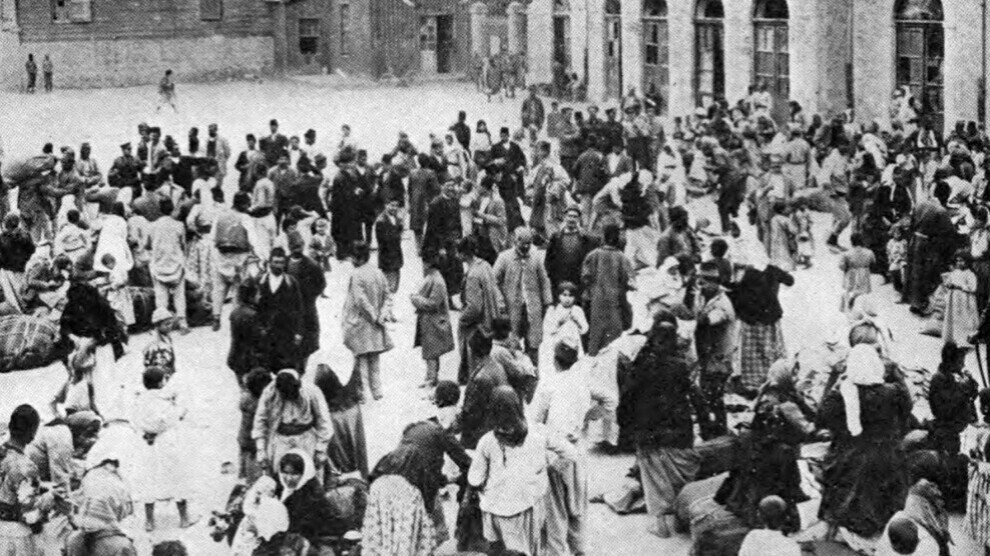24 April marks 108th anniversary of Armenian Genocide
Peace in Kurdistan remembers all the victims of the Armenian Genocide, one of the most appalling crimes and human tragedies of the modern age, on its 108th anniversary.
Peace in Kurdistan remembers all the victims of the Armenian Genocide, one of the most appalling crimes and human tragedies of the modern age, on its 108th anniversary.

Peace in Kurdistan remembers all the victims of the Armenian Genocide, one of the most appalling crimes and human tragedies of the modern age, "an unimaginable horror which was to be exceeded only by the Holocaust against the Jewish people. Sadly, the immense scale of this crime against the Armenian people is still to this day not fully acknowledged or understood."
Peace in Kurdistan said in a statement that "it is of course impossible ever to fully recompense the victims for their losses. The least we can do is remember them and honour their memory.
It is, however, still necessary to define and describe what exactly the Armenian Genocide was and how it transpired, for it was no accident nor was it an unforeseen consequence of a mistaken policy during time of war. It was in fact a deliberate, calculated and intended action that was planned and coordinated at the highest level of state policy whose aim was nothing less than the systematic elimination of an entire people, the ethnic Armenians.
The action led to the deaths of an estimated one and a half million Armenians who were forcibly expelled from their historic homelands through massacres and an enforced death march into the Syrian desert. It was a deliberate mass murder whose scale and horrors are still difficult to comprehend or imagine."
The statement added: "Despite the immense sufferings of the Armenian nation, Turkey’s forebears did not succeed in eliminating the Armenian people. We can derive hope from this. Likewise, the Turkish regime of today will never succeed in eliminating the Kurds, despite all its efforts to do so.
The Armenian Genocide can never be forgotten. Words are ultimately insufficient to fully convey the true significance of this darkest episode in the history of the Ottoman Empire during the First World War in its final years before its dissolution."
Peace in Kurdistan said: "Unlike President Erdogan and those to whom his aggressive sectarian rhetoric still has some appeal, the consciousness of the Kurds has undergone a total transformation in recent decades under the influence and leadership of Abdullah Ocalan and the Kurdish national political movement that he founded. The vision of the Kurds is now for reconciliation and peaceful existence between peoples sharing the resources that are abundantly available and building a better social existence for everyone. That points to the way forward for humanity.
We recall the horrors of the past to learn lessons that motivate us to renew the urgent political struggles that are required to put an end to the possibility of ever repeating past errors. In relation to current day Turkish politics, the Ottomans ultimately failed in their policy of denial and extermination of the Armenians. In the same way, Erdogan’s efforts to deny and exterminate the Kurds will also ultimately fail."
The Armenian Genocide, said Peace in Kurdistan Campaign, "is the most graphic illustration of the crimes committed under the rule of the Ottomans and modern Turkish nationalism. There is an alarming continuity of the actions waged against the Armenians more than a century ago and the war on all fronts that the Turkish state is waging against the Kurds today. The pains inflicted on the Armenians in the past and on the Kurds today are a consequence of similar aggression and bellicosity.
Modern Turkey is repeating the crimes of the past and Erdogan is surely leading the country to a calamitous defeat by wasting huge resources on waging his war against the Kurdish people. But after the darkness, the light will follow. Erdogan cannot succeed in permanently dividing the people along ethnic lines in an attempt to awaken atavistic hatred in his cynical attempt to maintain his grip on the reins of power. That grip is weakening."
The statement continued: "Glimmers of hope for change are rooted in the people and their growing awareness that the days are numbered for Erdogan and the AKP whose regime more and more resembles a tyranny. Popular resistance may well remove Erdogan once and for all in the upcoming elections. This will be a political earthquake equal to the physical earthquake that shook much of Turkey to its foundations in February.
A sense of hope and desire for real change will eventually see the final dislodgement of the current political leaders from office and mark the start of a new era where peace and reconciliation will have a chance of reshaping Turkey’s future.
As we look to the future in the expectation of major change, we send solidarity greetings to the Armenian people who are still implacably fighting for justice and full recognition of the magnitude of the crimes that were committed against their forebears in the early part of the last century."
The statement added: "Scarred by the memories of the horrors inflicted on millions of their ancestors, men and women, the elderly and the newly born alike, during what we now know as the Armenian Genocide, generations of Armenians continue to keep these memories alive.
Hope for a better future reflects the unflagging spirit that resides inside every human being. It is this capacity for hope to endure even in the darkest chapters of our history that is the pre-eminent quality of humanity, and it is that which will see us through the worst of times.
We join with the Armenian people in honouring all the victims of this great crime against all humanity. We share their continuing grief but draw inspiration from their spirit of resistance. It is in that resistance where true hope for the future of humanity lies."